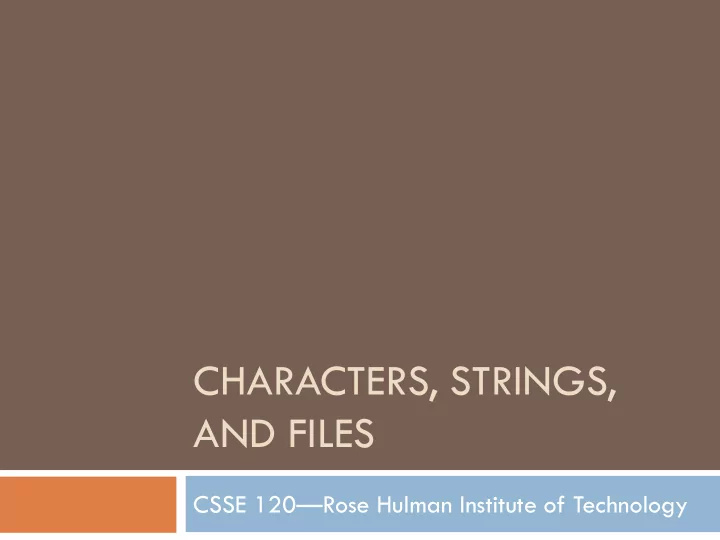

CHARACTERS, STRINGS, AND FILES CSSE 120 — Rose Hulman Institute of Technology
Characters, Strings, and Files
Characters in Python Just a special case of string >>> myChar = 'C' >>> print myChar C >>> print ord(myChar) # converts character to int 67 >>> print chr(67) # converts int to character C
Characters in C C's char type is really a kind of number! A char takes 1 byte of storage space Example: char myChar; myChar = 'C'; printf("%c\n", myChar); /* %c is format spec. for char */ printf("%d\n", myChar); /* can print char as a decimal */ printf("%c\n", 67); /* can print int as char */ myChar++; printf("%c\n", myChar); /* What prose do you suppose? */
Ten Ways to Say 'A' char c = 'A'; int i = 'A'; printf("A"); printf("%c", 'A'); printf("%c", 'B'-1); printf("%c", c); printf("%c", i); putchar('A'); /* can "push" single characters to output */ putchar('C' - 2); putchar(toupper('a')); /* Need to #include <ctype.h> */ putchar(c); putchar(i);
Math with Characters We can do math with character types: 'C' + 1 == 'D' char b = 'b'; b--; putchar(b); /* outputs a */ Combine these ideas to write a for loop that prints the characters from 'a' to 'z' on a single line Try this in Eclipse, work with a neighbor Write your answer on your quiz
Getting Characters To read a single character from the console use: getchar() Caveat: getchar() returns an int , either a char value or EOF (end of file) Note: most operating systems only void getSomeChars() { pass characters to your program int inChar; after the user presses the enter key int count = 0; printf("\n\nType some text, then press 'Enter': "); fflush(stdout); inChar = getchar(); while (inChar != '\n' && inChar != EOF) { count++; inChar = getchar(); } printf("\nYou entered %d characters.", count); }
Character Functions: ctype.h Conversion Functions: Test functions: int tolower(int c); isdigit(c) int toupper(int c); isalpha(c) islower(c) Modify getSomeChars() to: isupper(c) isspace(c) print each character entered Count the number of print the upper-case spaces entered version of each character See the C Library Reference link on ANGEL under Course Resources for more functions.
Just Stringing You Along "Strings" in C are just arrays of characters, with a '\0' at the end Example: char lname[10]; Example, string constants: char *fname = "Lou"; When would we use the 1 st declaration? the 2 nd ?
Programming Exercise Write a function getline() Signature: int getline(char s[], int lim); Spec: Gets a line of characters from the user and puts up to lim characters of it in the given array. Returns the length of the string. Example calling code: char lname[MAX_NAME]; int len; len = getline(lname, MAX_NAME); printf("\n\n'%s', has %d characters.\n", lname, len);
String Functions: string.h Function Purpose char *strcpy(char *s, char* ct) copy string ct to string s, including '\0'; return s char *strcat(char *s, char* ct) concatenate string ct to end of string s; return s int strcmp(char *cs, char *ct) compare string cs to string ct, return a negative number if cs<ct, zero if cs==ct, or positive otherwise char *strstr(char *cs, char *ct) return a pointer to first occurrence of ct in cs, or NULL if not present size_t strlen(char *cs) return length of cs (size_t is an typedef for int on most systems) Descriptions from K&R, p. 249. See the C Library Reference link on ANGEL for more.
String Concatenation Using strcat() Consider: char *s1 = "Go, Red! Go, White! "; char *s2 = "Go Rose, Fight!"; /* ??? */ printf("%s\n", s3); What goes in the space? We want: the output to be Go, Red! Go, White! Go Rose, Fight! and no additional string constants
Summary: Strings in C Strings are arrays of characters: char lname[10]; or char *fname = "Lou"; "Null terminated", that is, a '\0' at the end Don't forget to reserve enough space to hold the string Key Points!
Arrays of Strings Arrays of ints: int x; // an element int xA[4]; or int *xA; // an array of ints Strings are arrays of chars: char c; //an element char str[4]; or char *str; // a string, i.e., an array of chars So what's an array of strings? char *str; // an element char *strA[4] or char **strA; // an array of strings
When C Gives You Lemons… Problem: Python includes high level functions for strings C (and other languages) do not What if you need to use C, but also need strings? Solution: Make your own string functions! Homework: Check out CharsStringsFiles from your SVN repository See homework description linked from ANGEL
Recommend
More recommend